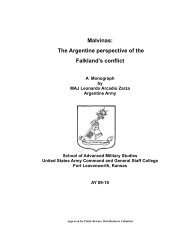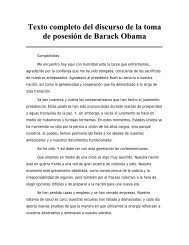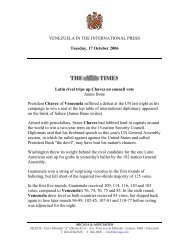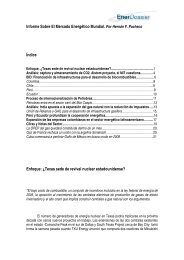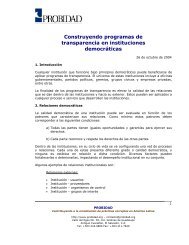the Iran-Contra affair, one of the most important political sc<strong>and</strong>als in the United States in the latterhalf of the twentieth century, offers critical insights into contemporary debates about foreign policymechanisms <strong>and</strong> the role of the military. 5 North’s responsibility as an individual, combined withcertain institutional enablers that flourished within the Reagan Administration’s conduct of foreignpolicy, resulted in an inexorable bifurcation between the traditional ethos of the U.S. armed forces—including such values as leadership, discipline <strong>and</strong> integrity that remain the bedrock training for theMarine Corps–<strong>and</strong> the foreign policy aims <strong>and</strong> practices of a conservative administration, despitetheir sometimes conflation in the popular mind. How North interpreted <strong>and</strong> applied the Corps’official motto, Semper Fidelis, (“Always Faithful” in Latin) while working at the NSC reflected theconflicting dem<strong>and</strong>s for loyalty <strong>and</strong> ethical behavior placed on the National <strong>Security</strong> Council (NSC)military aide <strong>and</strong>, in doing so, shed light on the profound differences in philosophy <strong>and</strong> interestsamong conservatives <strong>and</strong> within the armed forces as they picked their way through the origins of, theresponsibilities for, <strong>and</strong>, later, the significance of Iran-Contra.In parsing the story of Oliver North, a complex <strong>and</strong> often ambiguous portrait emerges of aconservative, anti-communist administration, torn between orthodox <strong>and</strong> political conservatism, <strong>and</strong>between loyalty to its goals of promoting democracy abroad <strong>and</strong> to a b<strong>and</strong> of covert operators whoskirted the rule of law at home while proclaiming their fealty to those same goals. The story ofIran-Contra <strong>and</strong> the role played by North is a reminder of the truths plumbed by historian RichardGid Powers on the nature of American anti-communism, “a complex, pluralistic movement” madeup of “Americans of very different beliefs <strong>and</strong> goals who disagreed among themselves almost asmuch as they disagreed with communism.” In the case of Reagan’s conservative foreign policy,an anti-communism held aloft by high ideals lived side-by-side with extremists unencumbered byscruple, who—like those of other times, such as FBI director J. Edgar Hoover <strong>and</strong> Senator JosephMcCarthy—while “far from being representative of the American anti-communist movement, werefor the most part digressions <strong>and</strong> distractions,” nevertheless often gave anticommunists the same malodor that equating the history of medical malpractice to that of medicine would give to the latter. 6To facilitate underst<strong>and</strong>ing of two variants of a single political philosophy, in this study politicalconservatism is equated with what historian Jerry Z. Muller has called “ideological conservatism,”that is, that which “arises from the anxiety that valuable institutions are endangered by contemporarydevelopments or by proposed reforms.” 7 Muller’s definition of ideological conservatism isparticularly appropriate in the context of the Reagan Administration’s willingness to up the ante inthe Cold War against the Soviet empire; its particular br<strong>and</strong> of anti-communism synonymous notwith the “managing” of the status quo of his predecessors, but rather “winning” the twilight struggleagainst the Soviets. 8Although sharing Reagan’s tough anti-communism, the military’s institutional conservatism,especially during the 1980s, was more akin to what Muller calls “orthodoxy,” whose defense ofinstitutions “depends on belief in their correspondence to some ultimate truth. … The positive valueascribed to institutions by conservatism contributes to its natural affinity for the status quo, in contrastto liberalism’s innate hostility towards authority <strong>and</strong> establishments.” In this way, the military can be5”He should certainly have been impeached <strong>and</strong> removed from office over the Iran-Contra racket, in which he was exposed as the president of a secret<strong>and</strong> illegal government, financed with an anti-constitutional hostage-trading <strong>and</strong> arms-dealing budget, as well as of the ostensibly legitimate one” criticChristopher Hitchens complained during Reagan’s centennial. Hitchens, “Reagan was a simple-minded genius” National Post, February 8, 2011.6Powers, Not Without Honor; The History of American Anticommunism, New York: The Free Press, pp. 426-427, 503.7Muller (ed.), Conservatism, An Anthology of Social <strong>and</strong> Political Thought from David Hume to the Present, Princeton: Princeton University Press,1997, p. 3. The basic thrust of Muller’s argument obtains even though, writing in at the end of the Reagan Administration, former domestic policychief Martin Anderson heralded the conservative intellectual <strong>and</strong> political “revolution” as “in many ways … profoundly nonconservative … its truecharacter—radical <strong>and</strong> revolutionary—for it was aimed at sweeping out the status quo … because its aim was fundamental change in the existingpolitical, economic <strong>and</strong> social order.” Anderson, Revolution. The Reagan Legacy, New York: Harcourt Brace Jovanovich, 1988, pp. 6-7.8On this point see, for example, Ronald Reagan Oral History Project, “Interview with Richard V. Allen,” Miller Center of Public Affairs, p. 26.Geostrategist Allen, Reagan’s first national security advisor, related his sense of thrill when Reagan confided in him that he wanted to “win” the ColdWar; he said he felt as if he had been hit with “a ton of bricks. I couldn’t believe it. The hair went up on the back of my neck.”132<strong>Security</strong> <strong>and</strong> <strong>Defense</strong> <strong>Studies</strong> <strong>Review</strong> <strong>2010</strong> <strong>Fall</strong>-Winter Issue / Edicíón Otoño-Invierno <strong>2010</strong> / Edicão Outono-Inverno <strong>2010</strong> / Volume 11
seen as a bulwark of “unbending values.” 9 Or, as an institution that shares the assumption, as RussellKirk posed it, that “there exists a transcendent moral order, to which we ought to try to conformthe ways of society.” 10 During the period under study, however, there were also indications thatthe military’s orthodox conservatism was itself in the process of morphing into a more ideologicalbr<strong>and</strong>. As one defense commentator noted, the military appeared to be “both more conservativethan their predecessors, <strong>and</strong> more politically active. The evidence is skimpy, <strong>and</strong> the definitions of‘conservative’ are unstated but almost certainly shifting. … The military increasingly appears to leantoward partisan conservatism.” 11The centrality of the role played in Iran-Contra by North, who had limited foreign affairs orintelligence experience, is without question, as was his meteoric ascent within the national securitybureaucracy. (As one of three military officers secunded to the White House, in 1981 North wasstill making <strong>and</strong> holding charts used by Reagan’s first national security advisor, Richard Allen,in briefings.) 12 Writing six years after the sc<strong>and</strong>al broke, one military observer noted that if onlythe decorated combat officer had remained a Marine Corps leader—staying at the margins of highpolitics—the Marines would have retained “a highly competent senior officer” <strong>and</strong> the country likelyspared the trauma of Iran-Contra. “For make no mistake, without Oliver North the Iran initiativewould certainly have developed differently <strong>and</strong> the profits from the arms sales to Iran most probablywould not have been diverted to support the Contra resistance in Nicaragua.” 13While the unorthodox, off-the-books actions taken by North <strong>and</strong> his superiors have beenjudged by often partisan <strong>and</strong> leftwing critics to be illegal <strong>and</strong> setting a dangerous precedent, othersmight contend that they were only an extreme byproduct of the shifting s<strong>and</strong>s of responsibility fornational security <strong>and</strong> defense between the Executive <strong>and</strong> Legislative branches, where bureaucraticmaneuvering outside public scrutiny allowed for both questionable innovation <strong>and</strong> unbridledpersonal protagonism. Such an examination is particularly useful given the preference of anotherconservative Administration—that of President George W. Bush—for an operational NSC to dealwith an even larger issue, the conduct of the war in Iraq, despite the cautions available from theexample of the Reagan presidency. 14 It is within that context that this paper will explore the tensionsbetween institutional versus political conservatism—as well as those institutional practices—thatfacilitated North’s shift away from the instincts <strong>and</strong> training of the military sphere to a lone wolfconservative activism, at the same time becoming, in the words of one observer, “the most powerfullieutenant colonel in the world.” 15NORTH SERVED AS DEPUTY DIRECTOR of political-military affairs at the NSC under twoNational <strong>Security</strong> Advisors, Robert “Bud” McFarlane <strong>and</strong> Adm. John Poindexter. During thattime, they <strong>and</strong> several other members of the Administration of Ronald Reagan helped sell arms toavowed enemy Iran; implausibly reaching out to Iranian “moderates,” <strong>and</strong> using the proceeds tofund, against Congressional prohibitions for doing so (the Bol<strong>and</strong> Amendment) 16 , the Contra rebelsin the Nicaraguan civil war. It was North who promoted a secret mission to Tehran for the purposeof directly negotiating with the Iranians, <strong>and</strong> it was the Marine who directly disobeyed an orderfrom National <strong>Security</strong> Advisor Adm. John Poindexter not to release any arms to the Iranians until9Steven Lee Myers, “Sc<strong>and</strong>al Kept in Military Perspective,” The New York Times, Dec. 1, 1998, A27.10Muller, op. cit, pp. 4, 11; Russell Kirk (ed.), The Portable Conservative Reader, New York: Penguin, 1982, p. xv. Tellingly, the index in Muller’santhology lists neither “military” nor “armed forces” despite ubiquitous popular reference to both as “conservative” institutions in the U.S. context.11Ricks, Making the Corps, New York: Scribner, 1997, pp. 279-282.12Ronald Reagan Oral History Project, op. cit., p. 50.13Anthony E. Hartle, “The Ethical Odyssey of Oliver North,” Parameters, Summer 1993, pp. 28-33. At the time he wrote the article, Hartle was directorof the philosophy program at the U.S. Military Academy at West Point.14For example, an assessment of the role of activist National <strong>Security</strong> Advisor Condoleezza Rice, whose “ardent support for the invasion” rendered herunable to play the traditional role of … impartial broker in the rough-<strong>and</strong>-tumble of interagency government,” is contained in Chitra Ragavan, “WhoLost Iraq?” U.S. News <strong>and</strong> World Report, Nov. 27, 2006.15Hartle, op. cit.16The Bol<strong>and</strong> Amendment was enacted due to concerns of widespread human rights abuses by the Contras, who received their initial military trainingfrom “dirty warriors” sent by Argentina’s brutal defacto regime.<strong>Security</strong> <strong>and</strong> <strong>Defense</strong> <strong>Studies</strong> <strong>Review</strong> <strong>2010</strong> <strong>Fall</strong>-Winter Issue / Edicíón Otoño-Invierno <strong>2010</strong> / Edicão Outono-Inverno <strong>2010</strong> / Volume 11 133
- Page 2 and 3:
Security and Defense Studies Review
- Page 4 and 5:
CommentariesSecurity Cooperation Be
- Page 6:
6Security and Defense Studies Revie
- Page 9 and 10:
El espacio de las mujeres en las Fu
- Page 11 and 12:
La organización e institucionaliza
- Page 14 and 15:
encuentra altamente asociada al cam
- Page 16 and 17:
ministerial para la equidad de gén
- Page 19 and 20:
BibliografíaBarrancos, Dora (2007)
- Page 21 and 22:
Anexo IPaísIncorporación Femenina
- Page 23:
Anexo IIMujeres militares sudameric
- Page 26:
Todo un conjunto de cualidades, cap
- Page 29:
500 y durante la Batalla de Sarand
- Page 32 and 33:
miembros de la soberanía de la Nac
- Page 34 and 35:
10 de octubre de ese año, la Compa
- Page 36 and 37:
algunos barcos de apoyo para alberg
- Page 38 and 39:
1.75 metros de altura y como requis
- Page 40 and 41:
de producción sustituyendo al homb
- Page 42 and 43:
y sicológica, no sólo en los ámb
- Page 44 and 45:
La segunda etapa se caracterizó po
- Page 46 and 47:
Sin embargo, las preguntas acerca d
- Page 48 and 49:
La normativa vinculada con la asign
- Page 50 and 51:
conductas que pudieran encuadrarse
- Page 52 and 53:
Género en el marco de las Operacio
- Page 54 and 55:
ecordar que las ciencias sociales y
- Page 56 and 57:
56Security and Defense Studies Revi
- Page 58 and 59:
De ese modo nos encontramos con mod
- Page 60 and 61:
escala descendente de la oficialida
- Page 62 and 63:
del total. Debe destacarse que dent
- Page 64 and 65:
BibliografíaCarreiras, H.: Gender
- Page 66 and 67:
Tras la aprobación de esta histór
- Page 68 and 69:
Una vez aprobada la Resolución 132
- Page 70 and 71:
para designar asesores de género e
- Page 73 and 74:
firme se ha materializado en la ado
- Page 76 and 77:
la construcción de la paz, la reco
- Page 78 and 79:
Sin embargo, a medida que avanzaba
- Page 81 and 82: Women on the Front Lines of the Fig
- Page 83 and 84: term even has meaning any longer wi
- Page 85 and 86: following graduation. 15 Of course,
- Page 87 and 88: including members from other Americ
- Page 89 and 90: Solidariedade ou interesse? O que l
- Page 91 and 92: em mais amplo e complexo. 7A possib
- Page 93 and 94: Participação dos Estados-Membros
- Page 95: sujeitos a alguma OMP. Aqueles que,
- Page 98 and 99: às recomendações das Fases II, I
- Page 100 and 101: Franco, que assumira após o Impeac
- Page 102 and 103: O Brasil, por intermédio do Presid
- Page 104 and 105: No entanto, no tocante especificame
- Page 106 and 107: Portanto, não se consegue visualiz
- Page 108 and 109: ReferênciasAlmeida Pinto, J.R. de;
- Page 110 and 111: ______. United Nations Department o
- Page 112 and 113: Beyond economic activities, the PRC
- Page 114 and 115: soy oil into the country, a flow wh
- Page 116 and 117: As is the case with Chinese investm
- Page 118 and 119: In some cases, Chinese companies, l
- Page 120 and 121: Although it is not possible to pred
- Page 122 and 123: Considering this, we will now go fr
- Page 124 and 125: The contribution of Chilean troops
- Page 126 and 127: within and outside the nation?3. Ho
- Page 128 and 129: 128Security and Defense Studies Rev
- Page 130 and 131: 130Security and Defense Studies Rev
- Page 134 and 135: all American hostages were released
- Page 136 and 137: “As he frequently said with pride
- Page 138 and 139: making operation 48 was conducted s
- Page 140 and 141: secret army alongside skilled profi
- Page 142 and 143: public than Kelly, taking issue wit
- Page 144 and 145: Some conservatives, even within the
- Page 146 and 147: opponents that he was “getting pr
- Page 148 and 149: for Defense (SUBDEF)—could initia
- Page 150 and 151: Hence, our countries are showing a
- Page 152 and 153: I am referring to Ibero-American Su
- Page 154 and 155: Thus, our country has agreed to the
- Page 156 and 157: sustraer mi producción intelectual
- Page 158 and 159: hombres (22,288).• Inclusión. Al
- Page 160 and 161: La perspectiva de trabajar en el di
- Page 162 and 163: 162Security and Defense Studies Rev
- Page 164 and 165: assignment on the U.S. Secretary of
- Page 166 and 167: las Operaciones de Paz se abren a u
- Page 168 and 169: ConclusiónA modo de conclusión, u
- Page 170 and 171: 170Security and Defense Studies Rev
- Page 172 and 173: offering insight into political ter
- Page 174 and 175: goods, and skilled labor must all b
- Page 176 and 177: country” like North Korea. To be
- Page 178 and 179: 178Security and Defense Studies Rev
- Page 180 and 181: views of women, in effect disabling
- Page 182 and 183:
Marine Col. William T. Hewes’ arg
- Page 184 and 185:
19. Hughes, Melanie M. (2007) “Un
- Page 186 and 187:
MacEoin. Commonweal 14: 8-11.This i
- Page 188 and 189:
37. Sans Echaìniz, María. (1992)
- Page 190 and 191:
47. Woodward, Rachel, and Patricia
- Page 192 and 193:
elucidativos das dificuldades que e
- Page 194 and 195:
194Security and Defense Studies Rev
- Page 196 and 197:
of an integrated Canadian company i
- Page 198 and 199:
198Security and Defense Studies Rev
- Page 200 and 201:
stated it would rightfully infringe
- Page 202 and 203:
First, through an examination of de
- Page 204 and 205:
204Security and Defense Studies Rev
- Page 206 and 207:
impact on the reader, by acknowledg
- Page 208 and 209:
To the Editor:Kevin P. Newmeyer’s
- Page 210 and 211:
Whitney Hoft was a Center for Hemis
- Page 212 and 213:
The transformation of the role of w
- Page 214 and 215:
en Puerto Rico, esta soldada resume
- Page 216 and 217:
Deconstruyendo a Ollie: Cómo los c
- Page 218:
Center for Hemispheric Defense Stud



